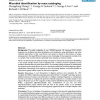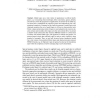2312 search results - page 459 / 463 » An algorithmic approach to knowledge evolution |
BMCBI
2006
14 years 11 months ago
2006
Background: The public availability of over 180,000 bacterial 16S ribosomal RNA (rRNA) sequences has facilitated microbial identification and classification using hybridization an...
102
click to vote
BMCBI
2006
14 years 11 months ago
2006
Background: To infer the tree of life requires knowledge of the common characteristics of each species descended from a common ancestor as the measuring criteria and a method to c...
JAPLL
2008
14 years 11 months ago
2008
In this paper, we study the following basic problem: After having executed a sequence of actions, find a sequence of actions that brings the agent back to the state just before th...
102
click to vote
DKE
2007
14 years 11 months ago
2007
Random walk graph and Markov chain based models are used heavily in many data and system analysis domains, including web, bioinformatics, and queuing. These models enable the desc...
KI
2008
Springer
14 years 11 months ago
2008
Springer
Abstract. Modal logics see a wide variety of applications in artificial intelligence, e.g. in reasoning about knowledge, belief, uncertainty, agency, defaults, and relevance. From ...


